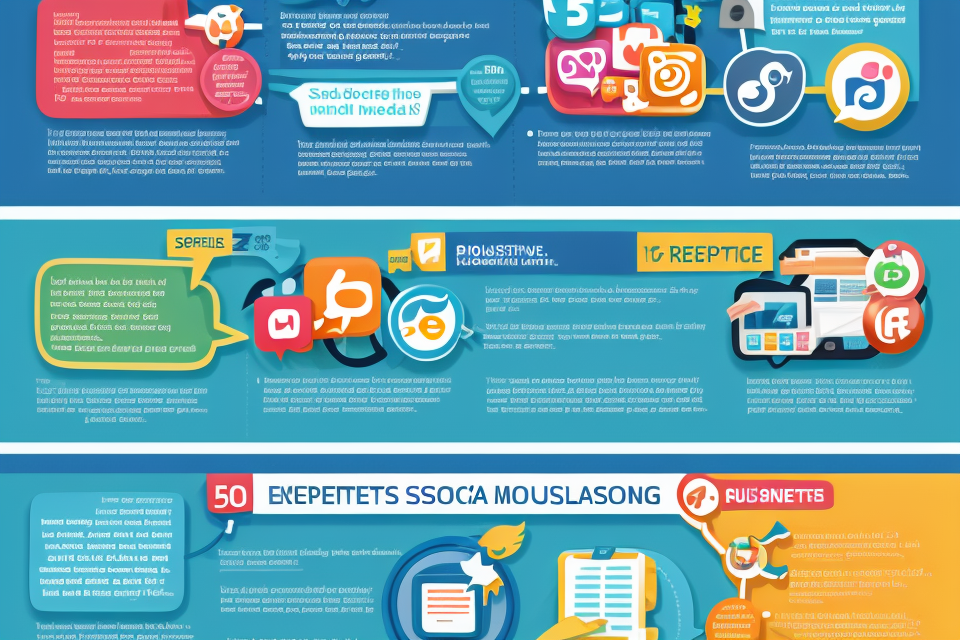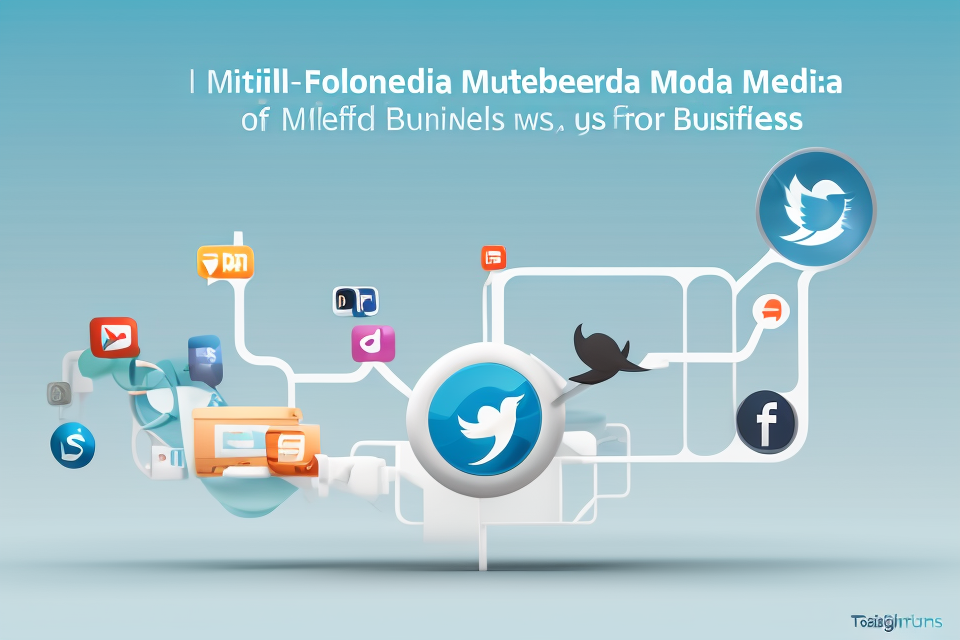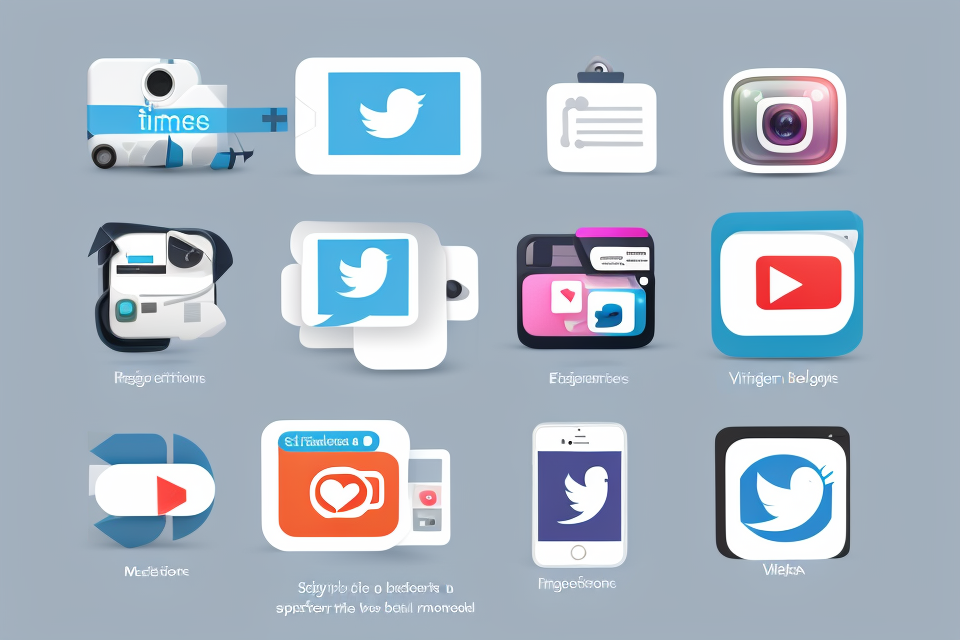Social media has become an integral part of our lives, connecting us with people from all over the world. While it has brought many benefits, there are also some downsides to consider. In this article, we will explore the top 5 pros and cons of social media, looking at both the positive and negative aspects of this powerful tool. Whether you’re a frequent user or just starting out, understanding these pros and cons can help you make the most of your social media experience. So, let’s dive in and explore the good, the bad, and the ugly of social media!
The Top 5 Pros of Social Media are: 1) Connecting with friends and family, 2) Staying informed about current events, 3) Building personal and professional networks, 4) Advertising and marketing opportunities, 5) Sharing and consuming content.
The Top 5 Cons of Social Media are: 1) Privacy concerns and data security, 2) Addiction and negative impact on mental health, 3) Spreading of misinformation and fake news, 4) Cyberbullying and online harassment, 5) Reduced face-to-face communication skills.
Advantages of Social Media
1. Enhanced Communication
Faster and Easier Communication
One of the most significant advantages of social media is that it allows for faster and easier communication. With just a few clicks, you can connect with people across the globe, regardless of their location. This has made it easier for businesses to expand their reach and connect with customers from different parts of the world.
Connecting with People Across the Globe
Social media has made it possible for people to connect with others from different cultures and backgrounds. This has helped to break down barriers and increase understanding and tolerance between different groups of people.
Real-Time Communication
Social media has also made it possible for people to communicate in real-time. This has been particularly useful for businesses, as it allows for instant communication between team members, regardless of their location. It has also made it easier for people to stay connected with friends and family, regardless of their physical distance.
2. Improved Marketing Opportunities
Targeted Advertising
In the digital age, social media platforms have emerged as a powerful tool for businesses to reach their target audience effectively. By utilizing social media advertising, companies can showcase their products or services to a specific demographic based on factors such as age, gender, location, interests, and behaviors. This allows businesses to deliver tailored messages to potential customers who are most likely to be interested in their offerings, increasing the likelihood of conversion and maximizing return on investment (ROI).
Building Brand Awareness
Social media provides an unparalleled opportunity for businesses to build brand awareness and establish a strong online presence. By consistently posting engaging content, responding to customer inquiries, and participating in relevant conversations, companies can create a positive image and foster a sense of community around their brand. Social media platforms also offer businesses the chance to showcase their unique personality and values, which can help differentiate them from competitors and resonate with their target audience.
Increased Customer Engagement
Social media has revolutionized the way businesses interact with their customers. By actively engaging with followers through likes, comments, shares, and direct messages, companies can build meaningful relationships and foster customer loyalty. Social media platforms also provide businesses with valuable feedback on their products or services, enabling them to make informed decisions and improve their offerings based on customer input. Moreover, social media allows businesses to humanize their brand by showcasing their employees, company culture, and behind-the-scenes activities, creating a more relatable and authentic brand image.
3. Expanded Information Access
One of the primary advantages of social media is the expanded access to information it provides. Social media platforms serve as a hub for the dissemination of information, allowing users to access a wealth of information from a variety of sources. This is particularly useful for individuals who may not have access to traditional information sources, such as those living in remote areas or those with limited financial resources.
Dissemination of Information
Social media platforms provide a platform for individuals and organizations to disseminate information to a wide audience. This can be particularly useful for businesses looking to reach a wider audience, as well as for individuals looking to share their ideas and opinions with a larger audience.
Knowledge Sharing
Social media also facilitates knowledge sharing, allowing individuals to access a wealth of information from a variety of sources. This can be particularly useful for students, researchers, and professionals looking to stay up-to-date on the latest developments in their field.
Research and Data Collection
Social media can also be a valuable tool for researchers and data collectors, providing access to a wealth of data on consumer behavior, opinions, and trends. This can be particularly useful for market researchers, as well as for individuals looking to better understand the needs and preferences of their target audience.
However, it is important to note that the information available on social media should be critically evaluated, as not all information is reliable or accurate. Additionally, the sheer volume of information available on social media can make it difficult to find the information that is most relevant to a particular topic or question. As such, it is important to use social media as a supplement to, rather than a replacement for, traditional information sources.
4. Networking and Collaboration
One of the most significant advantages of social media is the ability to connect with people from all over the world. This has made it easier for professionals to network and collaborate with others in their industry.
Building Professional Relationships
Social media has revolutionized the way professionals connect with each other. With just a few clicks, you can connect with people who share similar interests and goals. This has made it easier for professionals to build relationships and establish themselves in their industry.
Sharing Ideas and Resources
Social media has also become a platform for sharing ideas and resources. Professionals can use social media to share their work, ideas, and insights with others. This has led to the creation of a global community of professionals who are willing to share their knowledge and expertise with others.
Access to Mentorship and Support
Finally, social media has provided professionals with access to mentorship and support. Many successful professionals use social media to offer advice and guidance to others in their industry. This has made it easier for professionals to learn from each other and grow in their careers.
5. Personal and Professional Growth
Social media can provide an excellent platform for personal and professional growth. Here are some ways it can help:
Skill Development
One of the most significant advantages of social media is the opportunity to develop new skills. Social media platforms offer a variety of tools and features that can help users improve their communication, marketing, and technology skills. For example, users can learn how to create engaging content, use hashtags and keywords, and manage social media campaigns.
Building Credibility and Authority
Social media can also help users build credibility and authority in their personal or professional fields. By sharing valuable content and engaging with followers, users can establish themselves as experts in their areas of interest. Additionally, social media platforms provide opportunities to network with other professionals and potential clients, which can lead to new business opportunities and partnerships.
Building a Personal Brand
Another advantage of social media is the ability to build a personal brand. By creating a consistent image and voice across multiple platforms, users can establish themselves as unique and memorable individuals. This can help them stand out in a crowded job market or attract new customers for their businesses. Additionally, social media can provide a platform for users to showcase their creativity and personality, which can be appealing to potential employers or clients.
Overall, social media can be a powerful tool for personal and professional growth, providing opportunities for skill development, credibility building, and personal branding.
Disadvantages of Social Media
1. Addiction and Time Management Issues
Impact on Mental Health
Social media addiction has been linked to anxiety, depression, and sleep deprivation, as individuals become overly preoccupied with the constant stream of information and the need for social validation.
Negative Effects on Productivity
The addictive nature of social media can lead to decreased productivity, as users spend excessive amounts of time scrolling through feeds instead of focusing on work or other important tasks.
Reduced Face-to-Face Interactions
Social media addiction can lead to a reduction in face-to-face interactions, as individuals may prefer the ease and convenience of online communication over in-person conversations, which can result in feelings of isolation and disconnection from others.
2. Privacy Concerns
Data Breaches and Cybersecurity Risks
In recent years, there has been a growing concern over the security of personal information on social media platforms. Data breaches have become more frequent, and millions of users have had their personal information exposed, including names, email addresses, and even passwords. This can lead to identity theft and other cybercrimes, which can have serious consequences for individuals.
Furthermore, cybersecurity risks are also a concern for businesses that use social media to market and advertise their products. Companies need to be aware of the potential risks and take appropriate measures to protect their customers’ information.
Lack of Control Over Personal Information
Another concern with social media is the lack of control that users have over their personal information. Users often unwittingly share information with third-party applications and advertisers, which can then use that information for their own purposes. This can include targeted advertising, which can be intrusive and unsettling for users.
Additionally, users may not always be aware of how their information is being used by social media platforms. This lack of transparency can make it difficult for users to make informed decisions about what they share and with whom they share it.
Cyberbullying and Harassment
Cyberbullying and harassment are also significant concerns on social media. Social media platforms have been criticized for not doing enough to prevent bullying and harassment on their platforms. This can include online harassment, hate speech, and cyberstalking, which can have serious consequences for individuals.
Furthermore, cyberbullying and harassment can also have a significant impact on mental health. Victims of cyberbullying and harassment may experience anxiety, depression, and other mental health issues, which can have long-term effects on their well-being.
Overall, privacy concerns are a significant issue on social media, and users need to be aware of the potential risks and take appropriate measures to protect their personal information. Social media platforms also need to take responsibility for protecting their users’ information and preventing cyberbullying and harassment on their platforms.
3. Spread of Misinformation
- Fake News and Sensationalism
- Social media platforms have become breeding grounds for fake news and sensationalism, as individuals and groups use them to spread misleading or completely fabricated information to large audiences.
- This can lead to a breakdown in trust in the media and a rise in polarization, as people are more likely to believe information that confirms their existing beliefs and reject information that contradicts them.
- Manipulation of Public Opinion
- Social media platforms can also be used to manipulate public opinion, through the use of bots, trolls, and other forms of online propaganda.
- This can be used to influence elections, sway public opinion on certain issues, and even incite violence.
- Impact on Society and Politics
- The spread of misinformation and manipulation of public opinion can have serious consequences for society and politics.
- In some cases, it can lead to the spread of hate speech, discrimination, and even violence against certain groups of people.
- It can also undermine the legitimacy of democratic institutions and processes, as people become more skeptical of the information they receive and more polarized in their beliefs.
4. Negative Impact on Self-Esteem
Comparison to Others
Social media platforms allow users to compare their lives to the curated highlight reels of others, leading to feelings of inadequacy and low self-esteem. This constant comparison can create unrealistic expectations and fuel feelings of jealousy and envy.
Social Comparison and Insecurity
Social media encourages users to compare themselves to others, which can lead to feelings of insecurity and low self-esteem. People may feel like they are not measuring up, and this can negatively impact their mental health.
Low Self-Esteem and Mental Health Issues
Excessive use of social media has been linked to lower self-esteem and increased rates of anxiety and depression. The constant bombardment of idealized images and messages can make people feel inadequate and can contribute to mental health issues.
5. Addiction to Social Media
Compulsive Behavior
One of the primary concerns related to social media addiction is compulsive behavior. Users may find themselves unable to resist the urge to constantly check their social media feeds, even at the expense of other important activities such as work, school, or spending time with loved ones. This compulsive behavior can lead to a decreased ability to focus and reduced productivity.
Impact on Physical Health
Addiction to social media can also have a negative impact on physical health. Social media addicts may experience eye strain, headaches, and neck pain due to prolonged screen time. In addition, sedentary behavior associated with social media use can contribute to weight gain and an increased risk of obesity, heart disease, and other health problems.
Relationship Difficulties
Social media addiction can also create difficulties in personal relationships. Individuals may prioritize social media over face-to-face interactions, leading to a decrease in social skills and emotional connection with others. This can result in feelings of isolation and disconnection, and may even contribute to relationship breakdowns.
FAQs
1. What are the top 5 pros of social media?
The top 5 pros of social media are:
- Connectivity: Social media allows people to connect with others all over the world, regardless of their location.
- Information dissemination: Social media is a powerful tool for disseminating information and news to a large audience.
- Marketing and advertising: Social media provides businesses with a platform to reach a large audience and market their products or services.
- Networking: Social media is a great way to network and make new connections, both personally and professionally.
- Entertainment: Social media provides a wealth of entertainment options, from watching videos to playing games.
2. What are the top 5 cons of social media?
The top 5 cons of social media are:
- Addiction: Social media can be addictive, leading to a decrease in productivity and real-life social interactions.
- Privacy concerns: Social media platforms often collect and use personal data, raising concerns about privacy and data security.
- Cyberbullying: Social media can be a breeding ground for cyberbullying, leading to harassment and abuse.
- Misinformation: Social media is a primary source of misinformation, leading to the spread of fake news and conspiracy theories.
- Social isolation: Spending too much time on social media can lead to social isolation and a decrease in real-life social interactions.
3. How can I use social media responsibly?
To use social media responsibly, consider the following tips:
- Set limits: Set limits on your social media usage and take regular breaks to avoid addiction.
- Protect your privacy: Be mindful of what you share online and adjust your privacy settings to protect your personal information.
- Engage in meaningful interactions: Use social media to connect with others and engage in meaningful conversations.
- Be mindful of your content: Think before you post and consider the potential impact of your content on others.
- Educate yourself: Stay informed about the latest social media trends and developments, and be aware of the potential risks and dangers associated with social media use.
4. Is social media good or bad for society?
The impact of social media on society is complex and multifaceted. On one hand, social media has facilitated connectivity and the exchange of information and ideas. On the other hand, social media has also contributed to the spread of misinformation, cyberbullying, and social isolation. Ultimately, the impact of social media on society depends on how individuals and communities choose to use it.
5. How can parents monitor their children’s social media use?
Parents can monitor their children’s social media use by:
- Setting limits: Set limits on the amount of time children spend on social media and encourage them to take regular breaks.
- Monitoring activity: Review your child’s social media activity and communicate with them about appropriate behavior online.
- Adjusting privacy settings: Adjust privacy settings to limit the amount of personal information that is shared online.
- Using monitoring software: Consider using monitoring software to track your child’s social media activity and ensure their safety.
- Having open communication: Encourage open communication with your child about their social media use and any concerns they may have.



